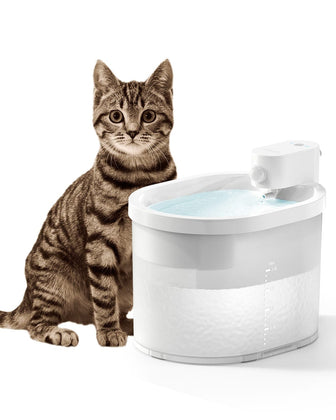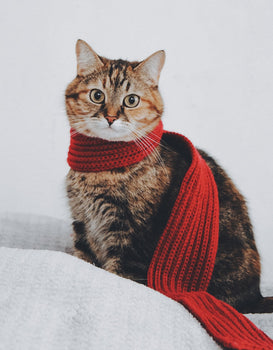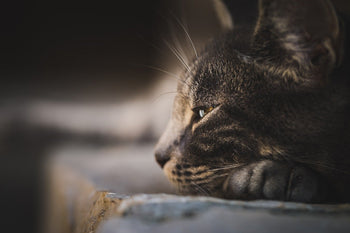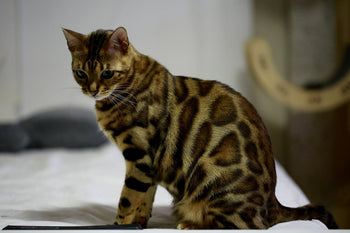Domestic shorthair cats are the most common cat breed in the United States, making up almost 95% of the cat population. Despite their popularity, many people are unaware of the unique characteristics and traits that make domestic shorthairs such beloved pets.
One of the defining features of domestic shorthairs is their mixed parentage. Unlike purebred cats, domestic shorthairs don't have a specific breed standard for appearance and temperament. As a result, they come in a wide variety of colors, sizes, and personalities. Domestic shorthairs are typically medium-sized and muscular with short, sleek coats and round heads and paws. They make great pets for families due to their friendly and adaptable nature.
Domestic Shorthair: The Most Popular Cat Breed in America

Key Takeaways
-
Domestic shorthair cats are the most common cat breed in the United States.
-
They are a mixed breed, resulting in a wide variety of physical characteristics and personalities.
-
Domestic shorthairs are friendly and adaptable, making them great pets for families.
Physical Characteristics
General Physical Traits
The Domestic Shorthair is a medium-sized cat breed with a muscular and athletic build. They typically weigh between 8 to 12 pounds and have a lifespan of 12 to 18 years. These cats have short, sleek fur that comes in a variety of colors and patterns. They are known for their round faces, large eyes, and short ears.
Domestic Shorthairs have a balanced and proportionate body, with a broad chest, sturdy legs, and a long tail. They have sharp claws that they use for climbing, hunting, and playing. These cats are agile and flexible, with a keen sense of balance and coordination.
Body Size and Shape
The DSH generally has a medium to large, muscular, and well-balanced body. Their legs are sturdy, and their paws are round. To answer the question “How big do domestic shorthair cats get?” they typically weigh between 8 to 15 pounds, with males often being larger than females.
Head
The head of a Domestic Shorthair is often rounded, but given the vast genetic diversity, some might exhibit slightly more elongated or angular faces. Their cheeks are often full, especially in males.
Eyes
The eyes of a DSH can be its most captivating feature. They are usually round and can come in various colors, often correlating with the cat's coat color. For instance, white cats might have blue, green, or even one of each (heterochromia), while a copper or deep gold eye color is prevalent in cats with an orange coat.
Coat and Color
The coat, as the name suggests, is short but can range from very sleek and close to the body to slightly plush. The coat is dense and provides the cat with insulation against various weather conditions. Regarding colors and patterns, the Domestic Shorthair is a true kaleidoscope. They can be found in virtually every cat color and pattern, including but not limited to solid (like black, white, blue, or red), tabby (mackerel, spotted, or classic), calico, tortoiseshell, and bi-color.
As for the types of domestic shorthair cats, it's a misnomer. Since DSH isn't a specific breed, the "type" refers to the coat color and pattern.

Breed Appearance Differences
While Domestic Shorthairs share many physical characteristics, there can be some differences in appearance based on their genetic makeup. Some of these differences include:
-
Coat color and pattern: Domestic Shorthairs can come in a wide range of colors and patterns, including solid, tabby, tortoiseshell, calico, and bi-color. The specific coloring and pattern of a cat's coat is determined by their genetics.
-
Facial structure: Some Domestic Shorthairs may have a more rounded or squished facial structure, while others may have a more angular or elongated face. This can be influenced by their breeding and genetics.
-
Body type: While Domestic Shorthairs generally have a balanced and proportionate body, there can be some variation in their body type based on their breeding and genetics. Some may have a more slender or lean build, while others may be more muscular or stocky.
Overall, Domestic Shorthairs are a versatile and adaptable breed with a range of physical characteristics. They are known for their playful and affectionate personalities, making them a popular choice for families and individuals alike.
Personality Traits
Typical Personality
Domestic Shorthair cats are known for their playful and energetic personalities. They are often described as curious, friendly, and adaptable. They enjoy playing with toys and interacting with their owners but are also content to spend time alone. Domestic Shorthairs are intelligent and can be trained to do tricks or respond to commands.
Domestic Shorthairs are also known for their hunting instincts. They are skilled hunters and enjoy chasing and catching prey, such as mice or insects. This trait can make them excellent mousers, but it can also lead to them bringing home "gifts" for their owners.

Temperament Comparison
Domestic Shorthairs have a similar temperament to other domestic cat breeds. They are generally friendly and affectionate, but can also be independent and aloof at times [3]. They are adaptable to different living situations and can thrive in both urban and rural environments.
Compared to purebred cats, Domestic Shorthairs do not have breed-specific temperaments or personality traits. Instead, their personalities are shaped by their individual experiences and interactions with their owners [3]. This can make them unpredictable, but also adds to their charm and uniqueness.
Overall, Domestic Shorthairs are beloved by many for their playful, friendly, and adaptable personalities. They make great companions for both individuals and families.
Essential Tips for Cat Health and Care
Domestic Shorthair cats are generally healthy, with a lifespan of 15 to 20 years, depending on factors like diet, health, and environment. To maintain their health and happiness, they require proper care, including regular veterinary check-ups, a balanced diet, and sufficient exercise. Additionally, proper hydration is crucial for their well-being, especially in preventing urinary tract infections and kidney issues. Using a water fountain can encourage cats to drink more water, helping to maintain their hydration balance. Compared to traditional water bowls, water fountains provide fresh, flowing water, which is more appealing to cats, encouraging them to drink more and promoting overall health.
Grooming and Exercise
Domestic Shorthairs have a short, dense coat that requires minimal grooming. Regular brushing can help remove loose fur and minimize hairballs. These cats are also active and playful, so providing them with toys and opportunities for exercise is important for their physical and mental well-being.
Common Health Issues
Like all cats, Domestic Shorthairs can be prone to certain health issues. Inflammatory Bowel Disease (IBD) is a common problem that can manifest as vomiting, diarrhea, loose stools, and weight loss. Obesity is also a concern, as these cats may be prone to overeating. Dental disease, urinary tract infections, and ear infections are other common health issues that can affect Domestic Shorthairs.
Breed-Specific Concerns
Domestic Shorthairs are a diverse breed, and there are no breed-specific health concerns. However, it's important to note that cats with white fur may be more prone to deafness, and cats with flat faces may be more prone to breathing difficulties.
Conclusion
Domestic Shorthair cats are a popular and beloved breed for many reasons. They are low-maintenance, adaptable, and come in a variety of colors and sizes. They make great pets for singles or families looking for an affordable and loving companion.
One of the unique qualities of Domestic Shorthair cats is their mixed parentage, which makes them less prone to health complications. They have short, sleek coats and round heads and paws. They are known for their loving and feisty personalities, which make them great for families.
In conclusion, Domestic Shorthair cats are cherished for their endearing personalities and unique qualities. By understanding their history, physical features, personalities, health considerations, and adoption process, you can provide the best possible care for your cat and ensure a fulfilling and loving relationship. Whether you're seeking a playful interactive companion or a laid-back lap cat, the Domestic Shorthair is sure to meet your expectations and provide years of love and affection.
Frequently Asked Questions
What is the average lifespan of a Domestic Shorthair cat?
Domestic Shorthair cats have an average lifespan of 15 to 20 years if they receive proper care and nutrition. However, some cats can live up to 25 years.
How much does a Domestic Shorthair kitten typically cost?
The cost of a Domestic Shorthair kitten varies depending on the location, breeder, and age of the kitten. On average, a Domestic Shorthair kitten can cost between $50 to $150.
What are the personality traits of Domestic Shorthair cats?
Domestic Shorthair cats are known for their friendly and playful personalities. They are intelligent, curious, and adaptable to different environments. They also tend to be affectionate towards their owners and enjoy spending time with them.
How can you tell the difference between a Domestic Shorthair and an American Shorthair?
The American Shorthair is a specific breed of cat, while the Domestic Shorthair is a mixed breed cat. The American Shorthair has a more defined breed standard, and their appearance tends to be more consistent. Domestic Shorthairs, on the other hand, come in a wide variety of colors, sizes, and statures.
Are Domestic Shorthair cats prone to any specific health issues?
Domestic Shorthair cats are generally healthy and not prone to any specific health issues. However, like all cats, they can develop health problems such as obesity, dental issues, and urinary tract problems. It is essential to take your cat for regular check-ups with a veterinarian to ensure they remain healthy.
What are the grooming requirements for a Domestic Shorthair cat?
Domestic Shorthair cats have short, sleek coats that require minimal grooming. They typically shed moderately throughout the year, and regular brushing can help keep their coat healthy and shiny. It is also important to trim their nails regularly and clean their ears to prevent infections.
Related Posts:
-
Why Is My Cat Drinking So Much Water: Common Causes and Solutions
-
Stainless Steel, Ceramic, or Plastic Cat Water Fountain: Which is the Best?
-
Best Cat Water Fountain for Multiple Pets: Top Picks for Hydrated Felines
-
UAHPET vs Petlibro Water Fountain: Which One is Better for Your Pet's Hydration Needs?

















